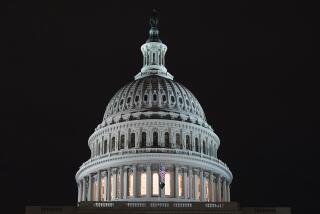Now, a focus on jobs
- Share via
Minutes after the Senate gave final approval to the hard-fought debt-ceiling deal, President Obama declared that it was time again for Washington to focus on jobs. It’s past time, really. But getting the divided ranks in Washington to agree on how to put people back to work won’t be any easier than getting them to agree to raise the debt limit. The tussle over the budget reflects the deep split between the two parties not just over the capital’s fiscal problems, but also over what those problems mean for the economy.
Signs abound that the economy was slipping back into another downturn while the administration and Congress were obsessing over the debt limit. The U.S. gross domestic product increased anemically in the first six months of the year, and the number of jobs created in June was practically microscopic. Consumer spending dropped that month for the first time since September 2009. Investors were so spooked, the Dow and the S&P 500 Index lost all or almost all of the gains they’d made this year.
Some Democrats and liberal economists have called for the government to try to spark some life into the economy with another infusion of borrowed cash — for example, by funding a huge new infrastructure-building program. But the $787-billion stimulus package that Congress passed in 2009 accomplished so much less than advertised, anything resembling it would have no chance of becoming law today. The package was flawed enough to undermine the concept of economic stimulus, even though many economists argue that it’s still the correct approach in the near term.
Obama was right Tuesday to argue that deficit reduction is just part of the answer. Ideally, Washington would have quelled anxiety about its fiscal problems by enacting a plan that addresses the unsustainable growth in healthcare entitlements and shrinks the deficit steadily until the budget gap is closed. But the debt-ceiling deal stopped well short of that point, guaranteeing months of additional squabbling and uncertainty.
Acknowledging that the ground has shifted, Obama didn’t call on Congress to go on a new borrowing binge to speed the recovery. He encouraged lawmakers to approve pending trade deals and patent-reform legislation that could spur private investment. Yet he also made an appeal for such deficit-widening steps as creating an “infrastructure bank” that could lend money for private construction projects. And he called on Congress to continue offering extended unemployment benefits to those who’d exhausted their state aid.
Those moves would help, but they won’t happen unless Republicans accept that the right kind of deficit spending can improve the economy. As the bitter negotiations of the last few weeks demonstrated, the GOP rejects that point of view in favor of fiscal austerity. We think that’s the wrong tonic today, but regardless of who’s right, the two parties’ conflicting visions seem certain to prevent progress in either direction.
More to Read
Inside the business of entertainment
The Wide Shot brings you news, analysis and insights on everything from streaming wars to production — and what it all means for the future.
You may occasionally receive promotional content from the Los Angeles Times.










